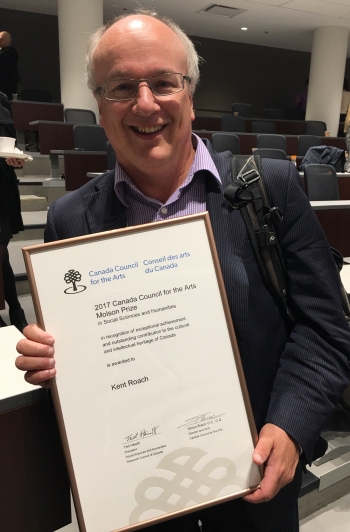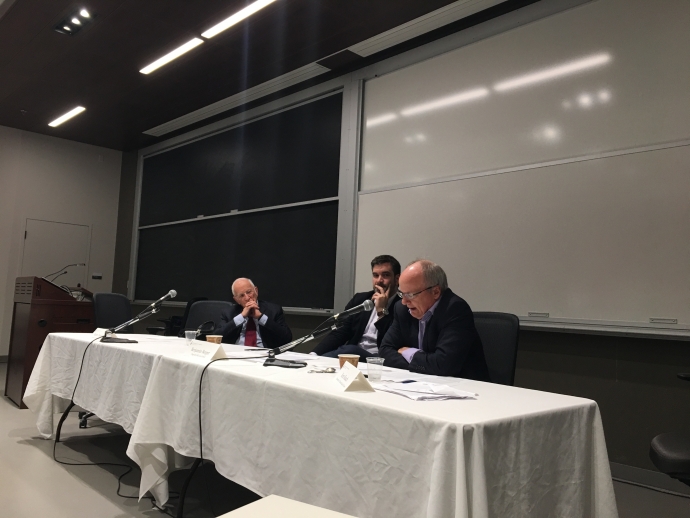“Reforming Criminal Justice and National Security” symposium calls for much needed improvements
By Christopher R. Graham, JD 2007
With the federal Liberal government promising significant reforms to the Criminal Code and Anti-Terrorism Act, 2015, and Ontario planning to amend its Police Services Act following Justice Michael Tulloch’s highly critical review of police accountability, the Faculty of Law convened a symposium to examine the most pressing concerns and specific reforms for criminal and national security law.
More than a dozen academics, policy-makers and practitioners at the May 30th “Reforming Criminal Justice and National Security” symposium presented papers, discussed ideas, and fielded questions from an engaged audience. The emerging consensus was clear and determined: Canadian criminal law and national security law must (finally) get better.
Everyone is always biased
Several presenters grounded recommendations for criminal justice reform in the need to address systemic bias. The Faculty of Law’s Amanda Carling, JD 2012, manager of the Indigenous Initiatives Office, opened the symposium by enumerating biases leading to wrongful convictions of Indigenous persons. Her presentation focused on wrongful convictions flowing from false guilty pleas, describing a justice system structurally blind to demonstrable bias in policing, legal representation, and judicial decision-making. “If all you ever saw of the system was stacked against you,” asked Carling, “and you were charged with something you didn’t do, why would you think you would get a fair trial? You wouldn’t. You would just plead guilty to get it over with.”
University of Toronto Professor Jonathan Freedman, Department of Psychology, identified another failure to address demonstrable bias: in the use of forensic evidence. Freedman described how basic standards of clinical research (such as the use of blind or double-blind studies to eliminate researcher bias) are not required in forensic pathology. A useful analogy is pharmaceutical research: would you trust a drug trial funded by a pharmaceutical company, un-vetted by independent researchers, and where future funding depends on the lab finding evidence that the drug works? Freedman explained that forensic pathology works just like that: police forces or the state pay labs to test specific outcomes: does this bullet match this gun?
Professor Emma Cunliffe, of UBC’s Peter Allard School of Law, suggested a structural mechanism for addressing bias (and other reform issues), via the creation of a justice and science commission to conduct ongoing, systemic reviews of the reliability of evidence in the criminal justice system. Cunliffe argued it was critical that the commission include people with legal, scientific and research expertise, and so be “truly multidisciplinary.”
The final two presentations in the morning focused on systemic discrimination. York University’s Jonathan Rudin, program director, Aboriginal Legal Services, argued Charter challenges to criminal laws mistakenly rely on abstract concepts like overbreadth and arbitrariness (under s. 7 of the Charter). Instead, such challenges should target the unequal impact of criminal laws (under s. 15 of the Charter), which, amongst other benefits, would focus law reform discussions on how criminal laws discriminate against vulnerable populations.
Professor Lorne Sossin, dean of Osgoode Hall Law School, and Professor Kent Roach, Prichard Wilson Chair in Law and Public Policy at the Faculty of Law, emphasized the importance of the engagement of racialized communities in the independent review of the police. While generally supportive of the recent report by Ontario Justice Michael Tulloch, recommending sweeping reforms, Sossin and Roach called for an institutional mechanism to support ongoing community consultation. “When the Special Investigations Unit finds that police caused serious injury or death, and releases video evidence, that is going to be another flashpoint that strains community relations,” said Roach. “It’s important that law reform reflect human interaction,” said Sossin. “Where lawyers see an independent tribunal, community members may see more people who don’t represent them making decisions that affect them.”
Evidence vs. Intelligence
The afternoon session featured five presentations engaging various opportunities to reform Canada’s national security law. Much of the afternoon’s discussion focused on the tension between intelligence and evidence: what is useful for national security may not support criminal prosecution of national security offences.
Professor Craig Forcese, University of Ottawa Faculty of Law, argued the relationship between intelligence and evidence was “the single most damning issue in Canadian national security law and policy.” Forcese criticized a general failure to coordinate between the Canadian Security Intelligence Service (CSIS) and the RCMP, creating situations where CSIS’s work undermines the RCMP’s ability to collect admissible evidence for criminal prosecutions. Citing the UK as an example where intelligence forces and police services coordinate successfully, Forcese argued similar coordination was possible under Canadian law, even before certain key reforms.
John Norris, adjunct professor at the U of T Faculty of Law, provided an interesting counterpoint to Forcese, discussing legal issues around CSIS human source privilege (i.e., where CSIS can promise secrecy and safety to individuals providing information to a CSIS investigation, analogous to the protection afforded confidential informants to police). Norris was skeptical such protection would hamper criminal investigations (though the situation was less clear where CSIS human sources are protected in security certificate cases).
Echoing another theme from the morning’s panel, two presenters addressed different aspects of the need for accountability in national security investigations. Professor Carmen Cheung, of the Munk School for Global Affairs at U of T, described a series of “accountability puzzles” arising from the use of computer algorithms in criminal and national security investigations. Cheung cautioned against the use of such technology (e.g., so-called predictive policing, using demographic data to identify criminal “hot spots” and allocate police services accordingly), pointing out the myriad ways technology built by humans reflects, even amplifies, bias in human decision-making.
Stanley Cohen, senior associate at the Munk School of Global Affairs, argued for a specific accountability mechanism in the national security context: reinstating the Office of the Inspector General, responsible to report to Cabinet on CSIS operations. Cohen outlined the benefits of such an office, including identifying illegal, unreasonable or unnecessary use of powers and, significantly, providing a mechanism by which CSIS can rehabilitate its public standing following the damaging findings of the Arar Inquiry.
By far the day’s most challenging paper was from Reem Zaia, an LLM student at the U of T Faculty of Law and an associate lawyer at Henein Hutchinson LLP, who argued for rehabilitation as an important principle in sentencing for terrorism offences. Citing specific evidence from 12 key cases, Zaia’s research showed how Canadian courts disregard expert psychological testimony in concluding that convicted terrorists are inherently dangerous, as well as binding Supreme Court of Canada precedent that rehabilitation is a relevant principle in sentencing on terrorism offences. She outlined statutory, policy, and common law reforms required to overturn the current situation where “life sentence is the presumptive conclusion” in terrorism cases.
It’s always been difficult
The day concluded with U of T Law’s Prof. Emeritus M.L. Friedland and Prof. Kent Roach reflecting on the challenges of law reform over the last six decades and in a more populist age. Friedland lamented a dearth of empirical work in law reform efforts, and suggested the advent of the Charter distracted lawyers, judges and policy-makers from traditional law reform activities (i.e., outside of Charter challenges). Roach noted the importance of legal academics in law reform efforts, and stressed the need for “engaged law professors” to work with both civil society and governments to ensure debates about reform were informed by research, and were not simply populist and political exercises in branding. He noted the research from the symposium will soon be published in a special issue of the Criminal Law Quarterly.

Fittingly, the day closed with Kent Roach being presented with the 2017 Molson Prize, which recognizes the remarkable achievements of distinguished Canadians, one in the arts and one in the social sciences, and encourages their ongoing contribution to Canada’s cultural and intellectual heritage.
The symposium “Reforming Criminal Justice and National Security” was hosted by the U of T Faculty of Law and supported by the Pierre Elliott Trudeau Foundation. Co-sponsored by the Criminal Law Quarterly and the Counter-Terrorism Law and Policy Group, Global Justice Lab at the Munk School of Global Affairs.


